Exploring Moral Responsibility and Ethics in Dante's Inferno
VerifiedAdded on 2021/09/30
|10
|2714
|433
Essay
AI Summary
This essay provides an in-depth analysis of morality and ethics as depicted in Dante Alighieri's Inferno. It explores the development of human morality, the distinction between conventional and moral judgment, and the cognitive systems involved in ethical decision-making. The essay examines the concept of heteronomy and its role in moral behavior, as well as the emotional guidance of morality and ethics. Through examining Dante's portrayal of sin and punishment, the essay delves into the philosophical underpinnings of moral responsibility and the consequences of human actions, offering insights into Dante's view of morality and the factors influencing ethical choices. The essay highlights Dante's perspective on the roles of reason, intention, and societal norms in shaping moral judgment and behavior. It also explores the impact of external influences on individual actions and the significance of personal conviction in ethical conduct.
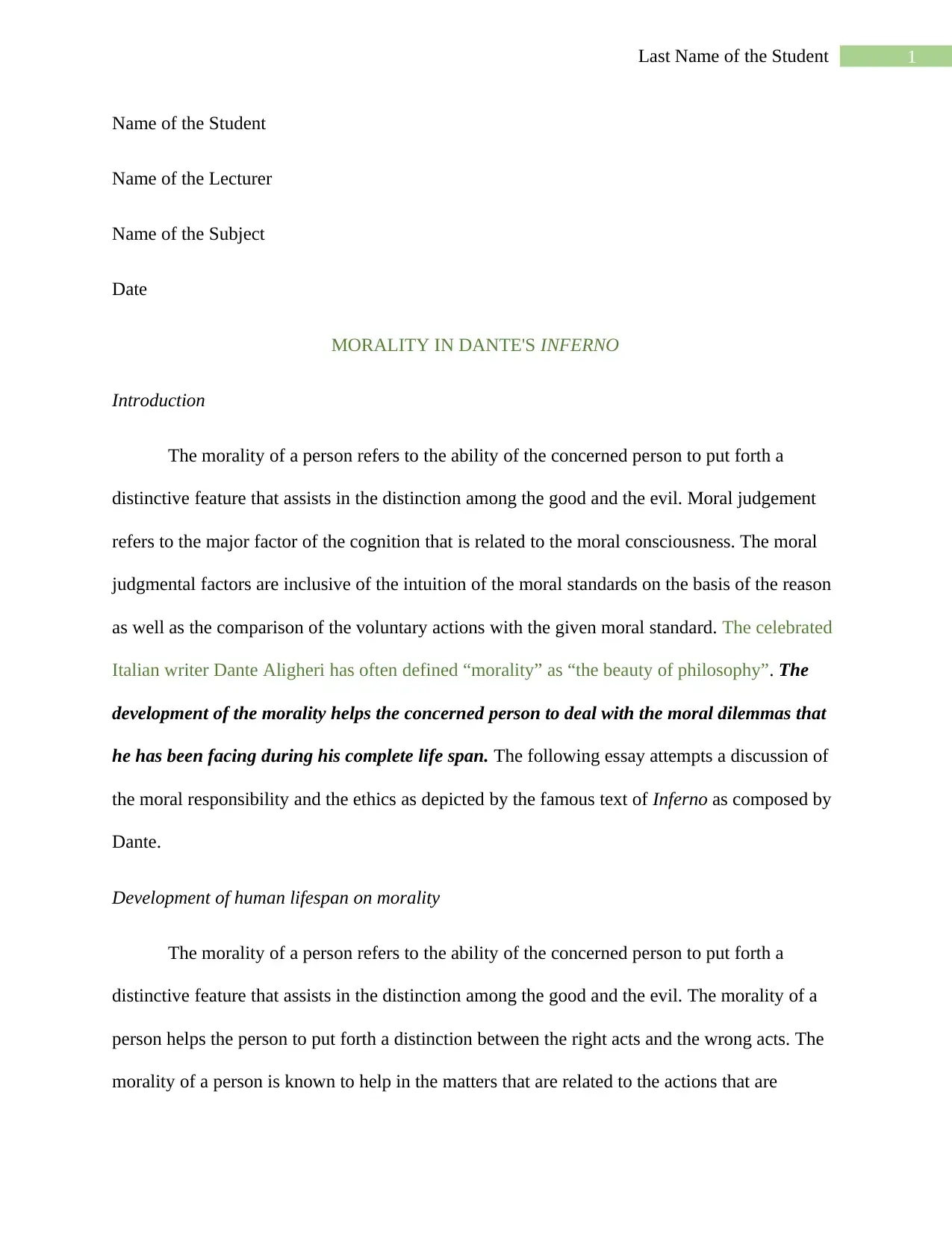
1Last Name of the Student
Name of the Student
Name of the Lecturer
Name of the Subject
Date
MORALITY IN DANTE'S INFERNO
Introduction
The morality of a person refers to the ability of the concerned person to put forth a
distinctive feature that assists in the distinction among the good and the evil. Moral judgement
refers to the major factor of the cognition that is related to the moral consciousness. The moral
judgmental factors are inclusive of the intuition of the moral standards on the basis of the reason
as well as the comparison of the voluntary actions with the given moral standard. The celebrated
Italian writer Dante Aligheri has often defined “morality” as “the beauty of philosophy”. The
development of the morality helps the concerned person to deal with the moral dilemmas that
he has been facing during his complete life span. The following essay attempts a discussion of
the moral responsibility and the ethics as depicted by the famous text of Inferno as composed by
Dante.
Development of human lifespan on morality
The morality of a person refers to the ability of the concerned person to put forth a
distinctive feature that assists in the distinction among the good and the evil. The morality of a
person helps the person to put forth a distinction between the right acts and the wrong acts. The
morality of a person is known to help in the matters that are related to the actions that are
Name of the Student
Name of the Lecturer
Name of the Subject
Date
MORALITY IN DANTE'S INFERNO
Introduction
The morality of a person refers to the ability of the concerned person to put forth a
distinctive feature that assists in the distinction among the good and the evil. Moral judgement
refers to the major factor of the cognition that is related to the moral consciousness. The moral
judgmental factors are inclusive of the intuition of the moral standards on the basis of the reason
as well as the comparison of the voluntary actions with the given moral standard. The celebrated
Italian writer Dante Aligheri has often defined “morality” as “the beauty of philosophy”. The
development of the morality helps the concerned person to deal with the moral dilemmas that
he has been facing during his complete life span. The following essay attempts a discussion of
the moral responsibility and the ethics as depicted by the famous text of Inferno as composed by
Dante.
Development of human lifespan on morality
The morality of a person refers to the ability of the concerned person to put forth a
distinctive feature that assists in the distinction among the good and the evil. The morality of a
person helps the person to put forth a distinction between the right acts and the wrong acts. The
morality of a person is known to help in the matters that are related to the actions that are
Paraphrase This Document
Need a fresh take? Get an instant paraphrase of this document with our AI Paraphraser
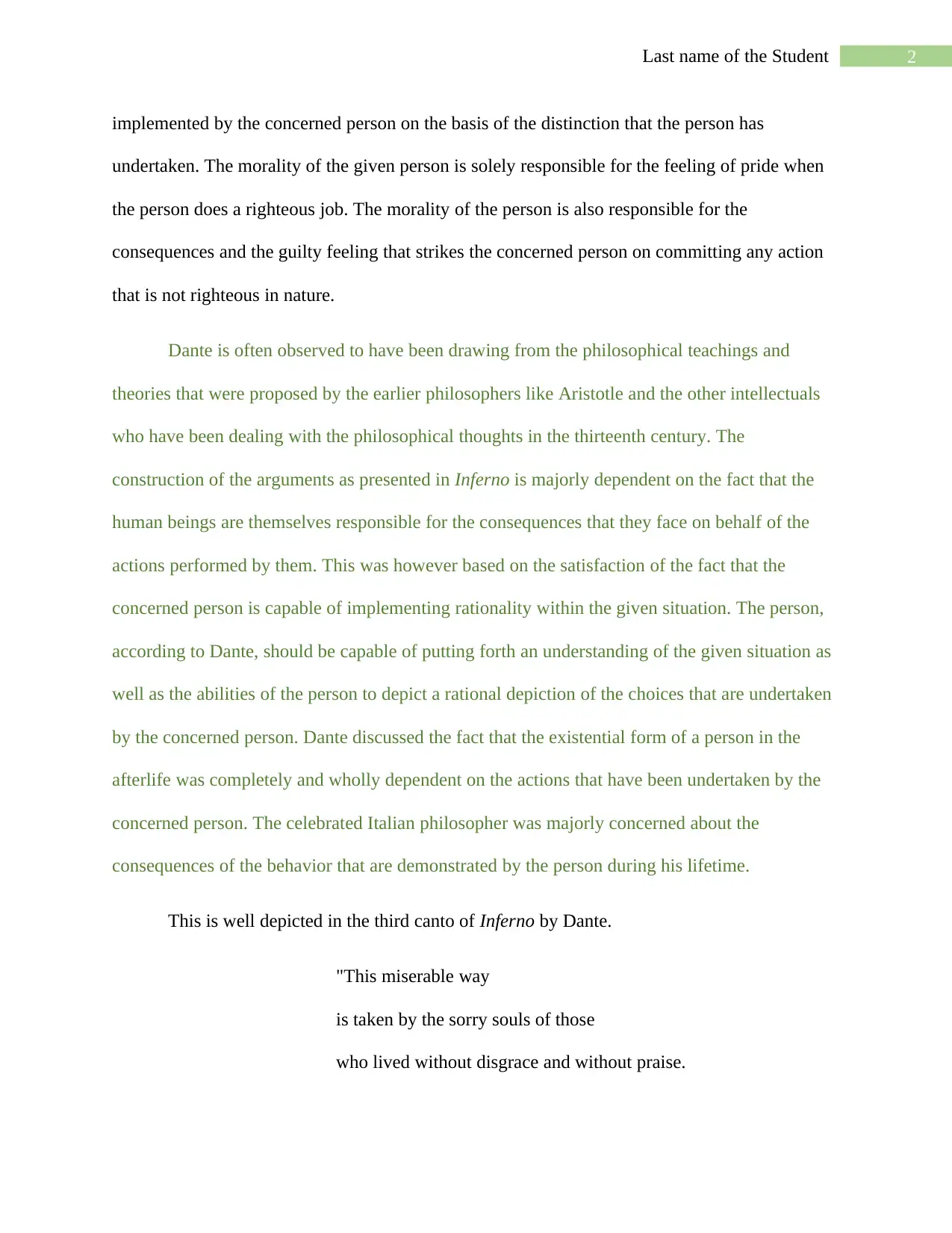
2Last name of the Student
implemented by the concerned person on the basis of the distinction that the person has
undertaken. The morality of the given person is solely responsible for the feeling of pride when
the person does a righteous job. The morality of the person is also responsible for the
consequences and the guilty feeling that strikes the concerned person on committing any action
that is not righteous in nature.
Dante is often observed to have been drawing from the philosophical teachings and
theories that were proposed by the earlier philosophers like Aristotle and the other intellectuals
who have been dealing with the philosophical thoughts in the thirteenth century. The
construction of the arguments as presented in Inferno is majorly dependent on the fact that the
human beings are themselves responsible for the consequences that they face on behalf of the
actions performed by them. This was however based on the satisfaction of the fact that the
concerned person is capable of implementing rationality within the given situation. The person,
according to Dante, should be capable of putting forth an understanding of the given situation as
well as the abilities of the person to depict a rational depiction of the choices that are undertaken
by the concerned person. Dante discussed the fact that the existential form of a person in the
afterlife was completely and wholly dependent on the actions that have been undertaken by the
concerned person. The celebrated Italian philosopher was majorly concerned about the
consequences of the behavior that are demonstrated by the person during his lifetime.
This is well depicted in the third canto of Inferno by Dante.
"This miserable way
is taken by the sorry souls of those
who lived without disgrace and without praise.
implemented by the concerned person on the basis of the distinction that the person has
undertaken. The morality of the given person is solely responsible for the feeling of pride when
the person does a righteous job. The morality of the person is also responsible for the
consequences and the guilty feeling that strikes the concerned person on committing any action
that is not righteous in nature.
Dante is often observed to have been drawing from the philosophical teachings and
theories that were proposed by the earlier philosophers like Aristotle and the other intellectuals
who have been dealing with the philosophical thoughts in the thirteenth century. The
construction of the arguments as presented in Inferno is majorly dependent on the fact that the
human beings are themselves responsible for the consequences that they face on behalf of the
actions performed by them. This was however based on the satisfaction of the fact that the
concerned person is capable of implementing rationality within the given situation. The person,
according to Dante, should be capable of putting forth an understanding of the given situation as
well as the abilities of the person to depict a rational depiction of the choices that are undertaken
by the concerned person. Dante discussed the fact that the existential form of a person in the
afterlife was completely and wholly dependent on the actions that have been undertaken by the
concerned person. The celebrated Italian philosopher was majorly concerned about the
consequences of the behavior that are demonstrated by the person during his lifetime.
This is well depicted in the third canto of Inferno by Dante.
"This miserable way
is taken by the sorry souls of those
who lived without disgrace and without praise.
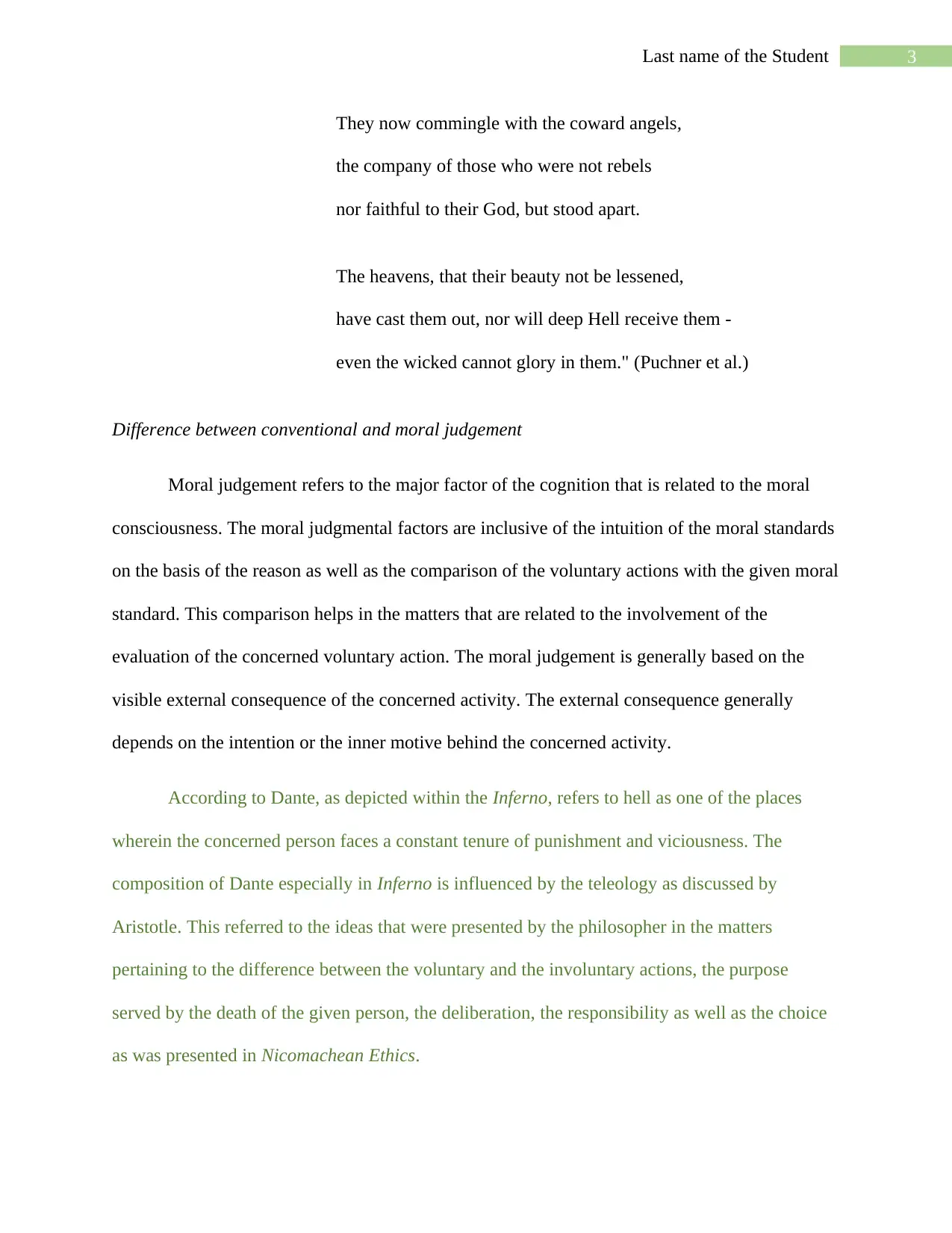
3Last name of the Student
They now commingle with the coward angels,
the company of those who were not rebels
nor faithful to their God, but stood apart.
The heavens, that their beauty not be lessened,
have cast them out, nor will deep Hell receive them -
even the wicked cannot glory in them." (Puchner et al.)
Difference between conventional and moral judgement
Moral judgement refers to the major factor of the cognition that is related to the moral
consciousness. The moral judgmental factors are inclusive of the intuition of the moral standards
on the basis of the reason as well as the comparison of the voluntary actions with the given moral
standard. This comparison helps in the matters that are related to the involvement of the
evaluation of the concerned voluntary action. The moral judgement is generally based on the
visible external consequence of the concerned activity. The external consequence generally
depends on the intention or the inner motive behind the concerned activity.
According to Dante, as depicted within the Inferno, refers to hell as one of the places
wherein the concerned person faces a constant tenure of punishment and viciousness. The
composition of Dante especially in Inferno is influenced by the teleology as discussed by
Aristotle. This referred to the ideas that were presented by the philosopher in the matters
pertaining to the difference between the voluntary and the involuntary actions, the purpose
served by the death of the given person, the deliberation, the responsibility as well as the choice
as was presented in Nicomachean Ethics.
They now commingle with the coward angels,
the company of those who were not rebels
nor faithful to their God, but stood apart.
The heavens, that their beauty not be lessened,
have cast them out, nor will deep Hell receive them -
even the wicked cannot glory in them." (Puchner et al.)
Difference between conventional and moral judgement
Moral judgement refers to the major factor of the cognition that is related to the moral
consciousness. The moral judgmental factors are inclusive of the intuition of the moral standards
on the basis of the reason as well as the comparison of the voluntary actions with the given moral
standard. This comparison helps in the matters that are related to the involvement of the
evaluation of the concerned voluntary action. The moral judgement is generally based on the
visible external consequence of the concerned activity. The external consequence generally
depends on the intention or the inner motive behind the concerned activity.
According to Dante, as depicted within the Inferno, refers to hell as one of the places
wherein the concerned person faces a constant tenure of punishment and viciousness. The
composition of Dante especially in Inferno is influenced by the teleology as discussed by
Aristotle. This referred to the ideas that were presented by the philosopher in the matters
pertaining to the difference between the voluntary and the involuntary actions, the purpose
served by the death of the given person, the deliberation, the responsibility as well as the choice
as was presented in Nicomachean Ethics.
⊘ This is a preview!⊘
Do you want full access?
Subscribe today to unlock all pages.

Trusted by 1+ million students worldwide
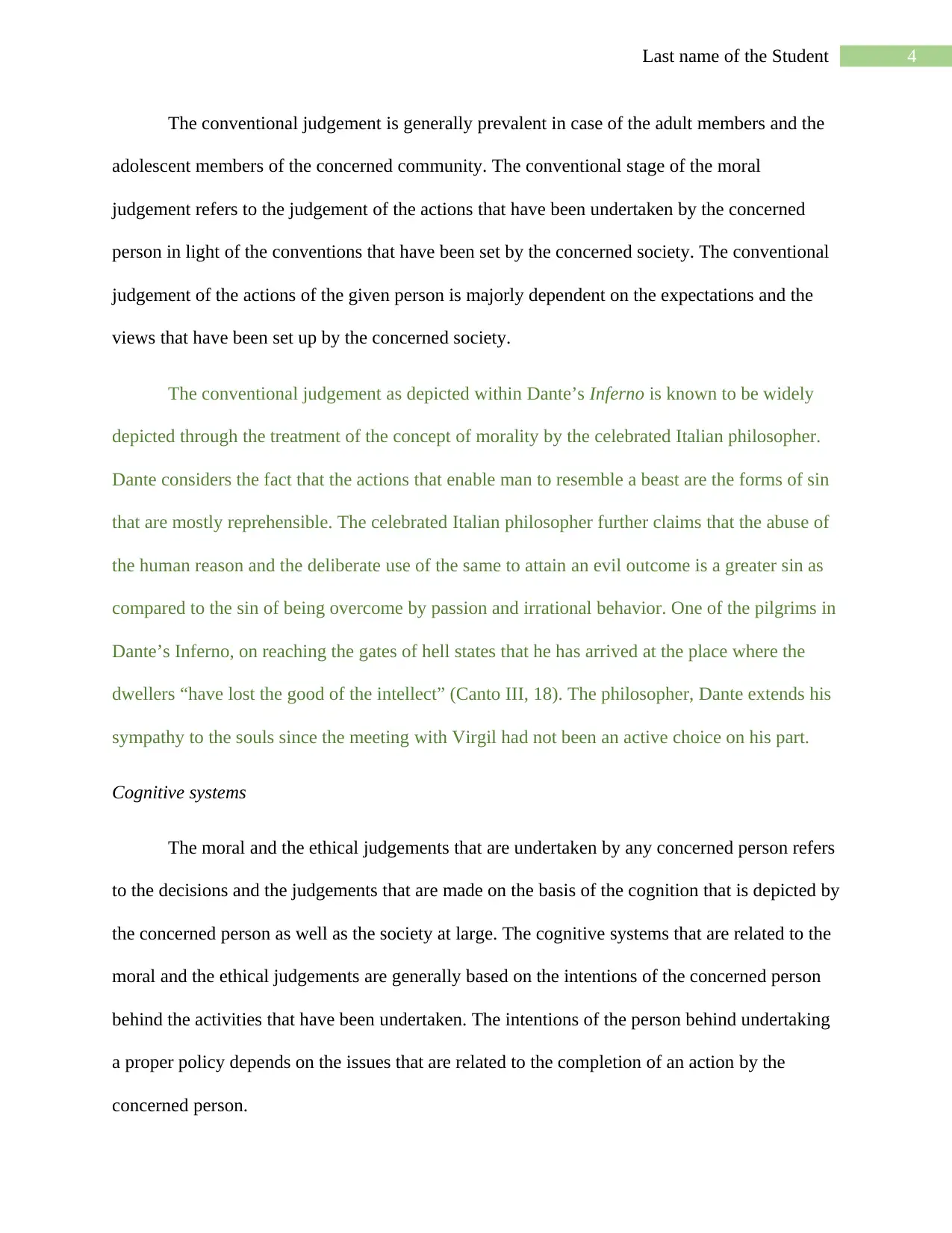
4Last name of the Student
The conventional judgement is generally prevalent in case of the adult members and the
adolescent members of the concerned community. The conventional stage of the moral
judgement refers to the judgement of the actions that have been undertaken by the concerned
person in light of the conventions that have been set by the concerned society. The conventional
judgement of the actions of the given person is majorly dependent on the expectations and the
views that have been set up by the concerned society.
The conventional judgement as depicted within Dante’s Inferno is known to be widely
depicted through the treatment of the concept of morality by the celebrated Italian philosopher.
Dante considers the fact that the actions that enable man to resemble a beast are the forms of sin
that are mostly reprehensible. The celebrated Italian philosopher further claims that the abuse of
the human reason and the deliberate use of the same to attain an evil outcome is a greater sin as
compared to the sin of being overcome by passion and irrational behavior. One of the pilgrims in
Dante’s Inferno, on reaching the gates of hell states that he has arrived at the place where the
dwellers “have lost the good of the intellect” (Canto III, 18). The philosopher, Dante extends his
sympathy to the souls since the meeting with Virgil had not been an active choice on his part.
Cognitive systems
The moral and the ethical judgements that are undertaken by any concerned person refers
to the decisions and the judgements that are made on the basis of the cognition that is depicted by
the concerned person as well as the society at large. The cognitive systems that are related to the
moral and the ethical judgements are generally based on the intentions of the concerned person
behind the activities that have been undertaken. The intentions of the person behind undertaking
a proper policy depends on the issues that are related to the completion of an action by the
concerned person.
The conventional judgement is generally prevalent in case of the adult members and the
adolescent members of the concerned community. The conventional stage of the moral
judgement refers to the judgement of the actions that have been undertaken by the concerned
person in light of the conventions that have been set by the concerned society. The conventional
judgement of the actions of the given person is majorly dependent on the expectations and the
views that have been set up by the concerned society.
The conventional judgement as depicted within Dante’s Inferno is known to be widely
depicted through the treatment of the concept of morality by the celebrated Italian philosopher.
Dante considers the fact that the actions that enable man to resemble a beast are the forms of sin
that are mostly reprehensible. The celebrated Italian philosopher further claims that the abuse of
the human reason and the deliberate use of the same to attain an evil outcome is a greater sin as
compared to the sin of being overcome by passion and irrational behavior. One of the pilgrims in
Dante’s Inferno, on reaching the gates of hell states that he has arrived at the place where the
dwellers “have lost the good of the intellect” (Canto III, 18). The philosopher, Dante extends his
sympathy to the souls since the meeting with Virgil had not been an active choice on his part.
Cognitive systems
The moral and the ethical judgements that are undertaken by any concerned person refers
to the decisions and the judgements that are made on the basis of the cognition that is depicted by
the concerned person as well as the society at large. The cognitive systems that are related to the
moral and the ethical judgements are generally based on the intentions of the concerned person
behind the activities that have been undertaken. The intentions of the person behind undertaking
a proper policy depends on the issues that are related to the completion of an action by the
concerned person.
Paraphrase This Document
Need a fresh take? Get an instant paraphrase of this document with our AI Paraphraser
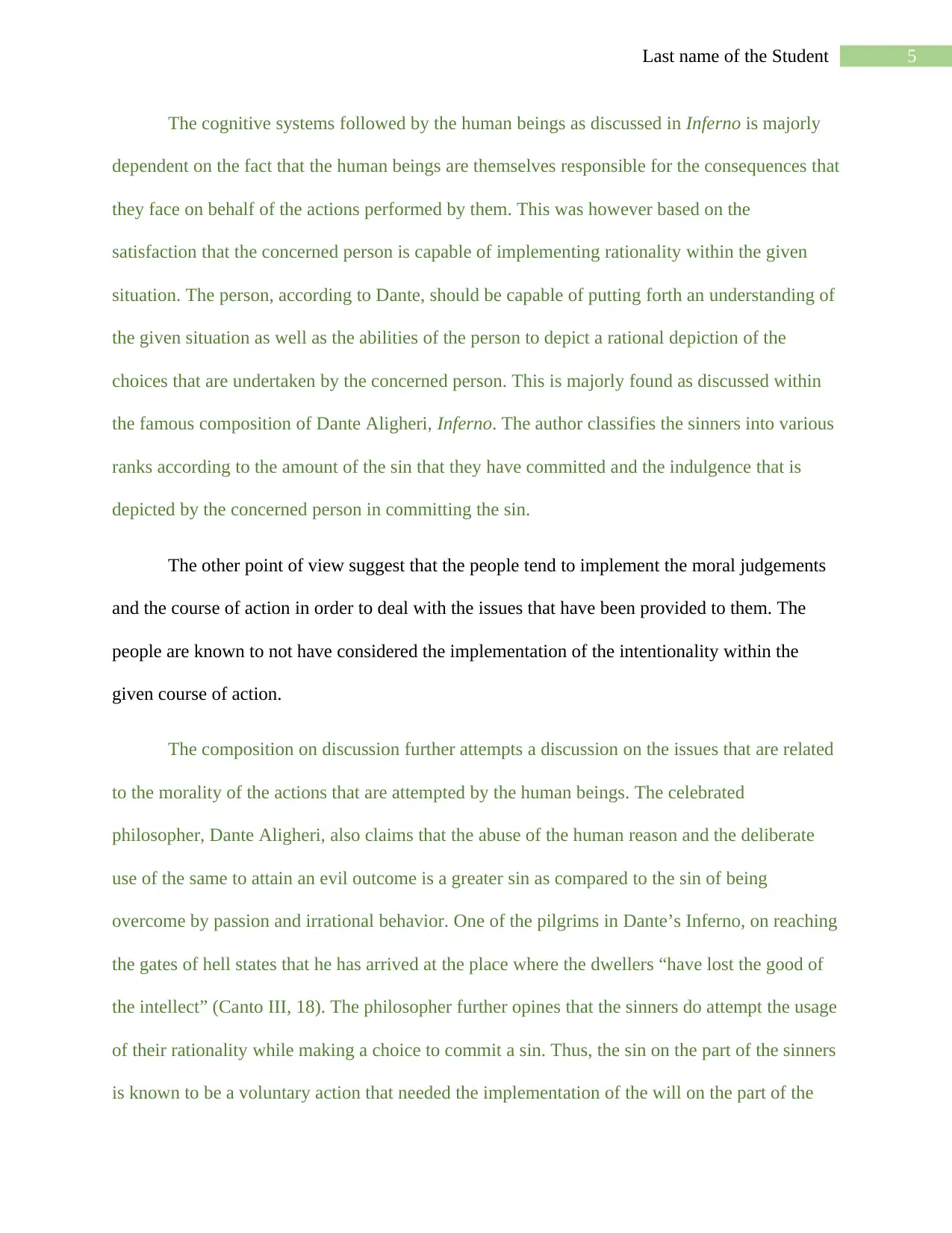
5Last name of the Student
The cognitive systems followed by the human beings as discussed in Inferno is majorly
dependent on the fact that the human beings are themselves responsible for the consequences that
they face on behalf of the actions performed by them. This was however based on the
satisfaction that the concerned person is capable of implementing rationality within the given
situation. The person, according to Dante, should be capable of putting forth an understanding of
the given situation as well as the abilities of the person to depict a rational depiction of the
choices that are undertaken by the concerned person. This is majorly found as discussed within
the famous composition of Dante Aligheri, Inferno. The author classifies the sinners into various
ranks according to the amount of the sin that they have committed and the indulgence that is
depicted by the concerned person in committing the sin.
The other point of view suggest that the people tend to implement the moral judgements
and the course of action in order to deal with the issues that have been provided to them. The
people are known to not have considered the implementation of the intentionality within the
given course of action.
The composition on discussion further attempts a discussion on the issues that are related
to the morality of the actions that are attempted by the human beings. The celebrated
philosopher, Dante Aligheri, also claims that the abuse of the human reason and the deliberate
use of the same to attain an evil outcome is a greater sin as compared to the sin of being
overcome by passion and irrational behavior. One of the pilgrims in Dante’s Inferno, on reaching
the gates of hell states that he has arrived at the place where the dwellers “have lost the good of
the intellect” (Canto III, 18). The philosopher further opines that the sinners do attempt the usage
of their rationality while making a choice to commit a sin. Thus, the sin on the part of the sinners
is known to be a voluntary action that needed the implementation of the will on the part of the
The cognitive systems followed by the human beings as discussed in Inferno is majorly
dependent on the fact that the human beings are themselves responsible for the consequences that
they face on behalf of the actions performed by them. This was however based on the
satisfaction that the concerned person is capable of implementing rationality within the given
situation. The person, according to Dante, should be capable of putting forth an understanding of
the given situation as well as the abilities of the person to depict a rational depiction of the
choices that are undertaken by the concerned person. This is majorly found as discussed within
the famous composition of Dante Aligheri, Inferno. The author classifies the sinners into various
ranks according to the amount of the sin that they have committed and the indulgence that is
depicted by the concerned person in committing the sin.
The other point of view suggest that the people tend to implement the moral judgements
and the course of action in order to deal with the issues that have been provided to them. The
people are known to not have considered the implementation of the intentionality within the
given course of action.
The composition on discussion further attempts a discussion on the issues that are related
to the morality of the actions that are attempted by the human beings. The celebrated
philosopher, Dante Aligheri, also claims that the abuse of the human reason and the deliberate
use of the same to attain an evil outcome is a greater sin as compared to the sin of being
overcome by passion and irrational behavior. One of the pilgrims in Dante’s Inferno, on reaching
the gates of hell states that he has arrived at the place where the dwellers “have lost the good of
the intellect” (Canto III, 18). The philosopher further opines that the sinners do attempt the usage
of their rationality while making a choice to commit a sin. Thus, the sin on the part of the sinners
is known to be a voluntary action that needed the implementation of the will on the part of the
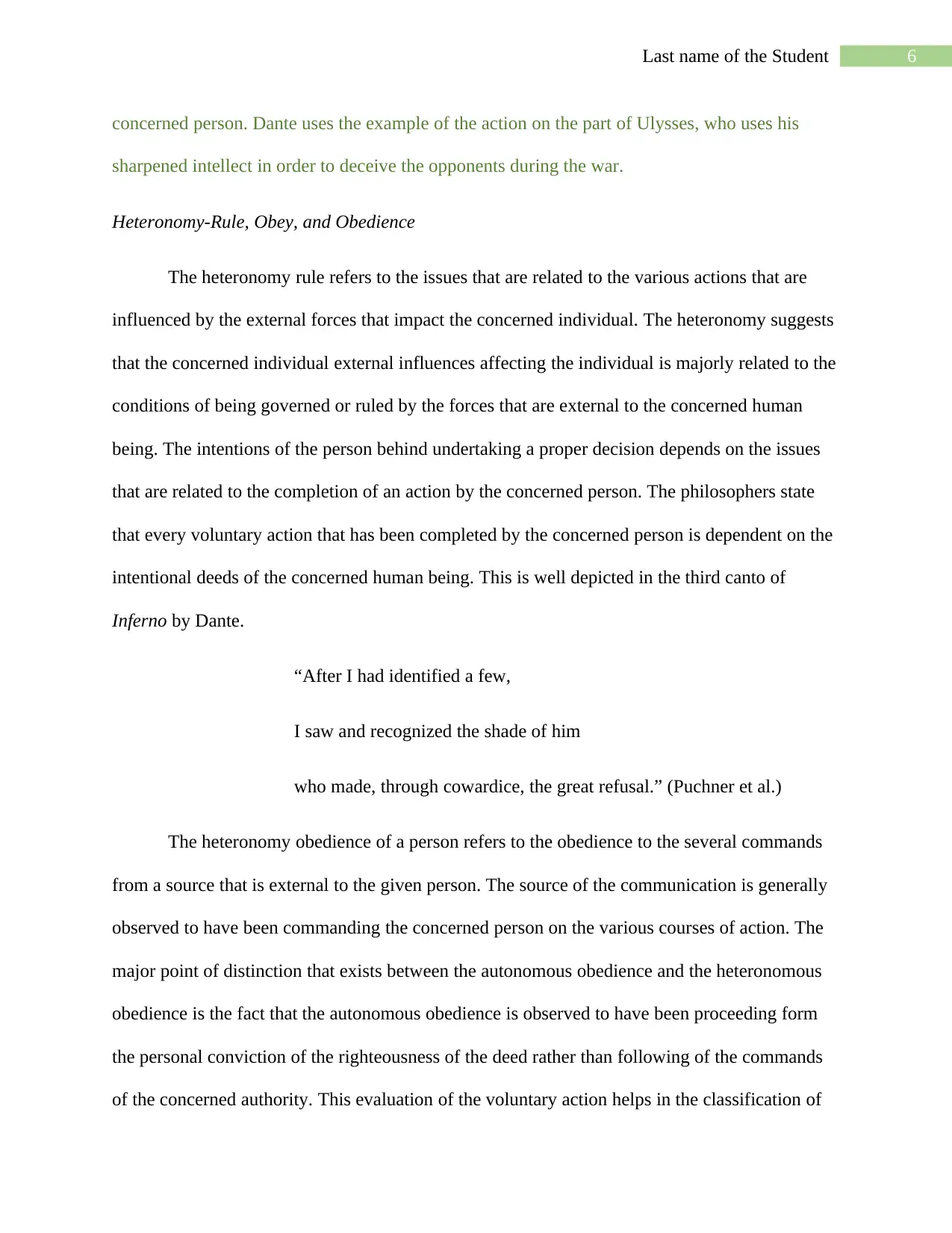
6Last name of the Student
concerned person. Dante uses the example of the action on the part of Ulysses, who uses his
sharpened intellect in order to deceive the opponents during the war.
Heteronomy-Rule, Obey, and Obedience
The heteronomy rule refers to the issues that are related to the various actions that are
influenced by the external forces that impact the concerned individual. The heteronomy suggests
that the concerned individual external influences affecting the individual is majorly related to the
conditions of being governed or ruled by the forces that are external to the concerned human
being. The intentions of the person behind undertaking a proper decision depends on the issues
that are related to the completion of an action by the concerned person. The philosophers state
that every voluntary action that has been completed by the concerned person is dependent on the
intentional deeds of the concerned human being. This is well depicted in the third canto of
Inferno by Dante.
“After I had identified a few,
I saw and recognized the shade of him
who made, through cowardice, the great refusal.” (Puchner et al.)
The heteronomy obedience of a person refers to the obedience to the several commands
from a source that is external to the given person. The source of the communication is generally
observed to have been commanding the concerned person on the various courses of action. The
major point of distinction that exists between the autonomous obedience and the heteronomous
obedience is the fact that the autonomous obedience is observed to have been proceeding form
the personal conviction of the righteousness of the deed rather than following of the commands
of the concerned authority. This evaluation of the voluntary action helps in the classification of
concerned person. Dante uses the example of the action on the part of Ulysses, who uses his
sharpened intellect in order to deceive the opponents during the war.
Heteronomy-Rule, Obey, and Obedience
The heteronomy rule refers to the issues that are related to the various actions that are
influenced by the external forces that impact the concerned individual. The heteronomy suggests
that the concerned individual external influences affecting the individual is majorly related to the
conditions of being governed or ruled by the forces that are external to the concerned human
being. The intentions of the person behind undertaking a proper decision depends on the issues
that are related to the completion of an action by the concerned person. The philosophers state
that every voluntary action that has been completed by the concerned person is dependent on the
intentional deeds of the concerned human being. This is well depicted in the third canto of
Inferno by Dante.
“After I had identified a few,
I saw and recognized the shade of him
who made, through cowardice, the great refusal.” (Puchner et al.)
The heteronomy obedience of a person refers to the obedience to the several commands
from a source that is external to the given person. The source of the communication is generally
observed to have been commanding the concerned person on the various courses of action. The
major point of distinction that exists between the autonomous obedience and the heteronomous
obedience is the fact that the autonomous obedience is observed to have been proceeding form
the personal conviction of the righteousness of the deed rather than following of the commands
of the concerned authority. This evaluation of the voluntary action helps in the classification of
⊘ This is a preview!⊘
Do you want full access?
Subscribe today to unlock all pages.

Trusted by 1+ million students worldwide
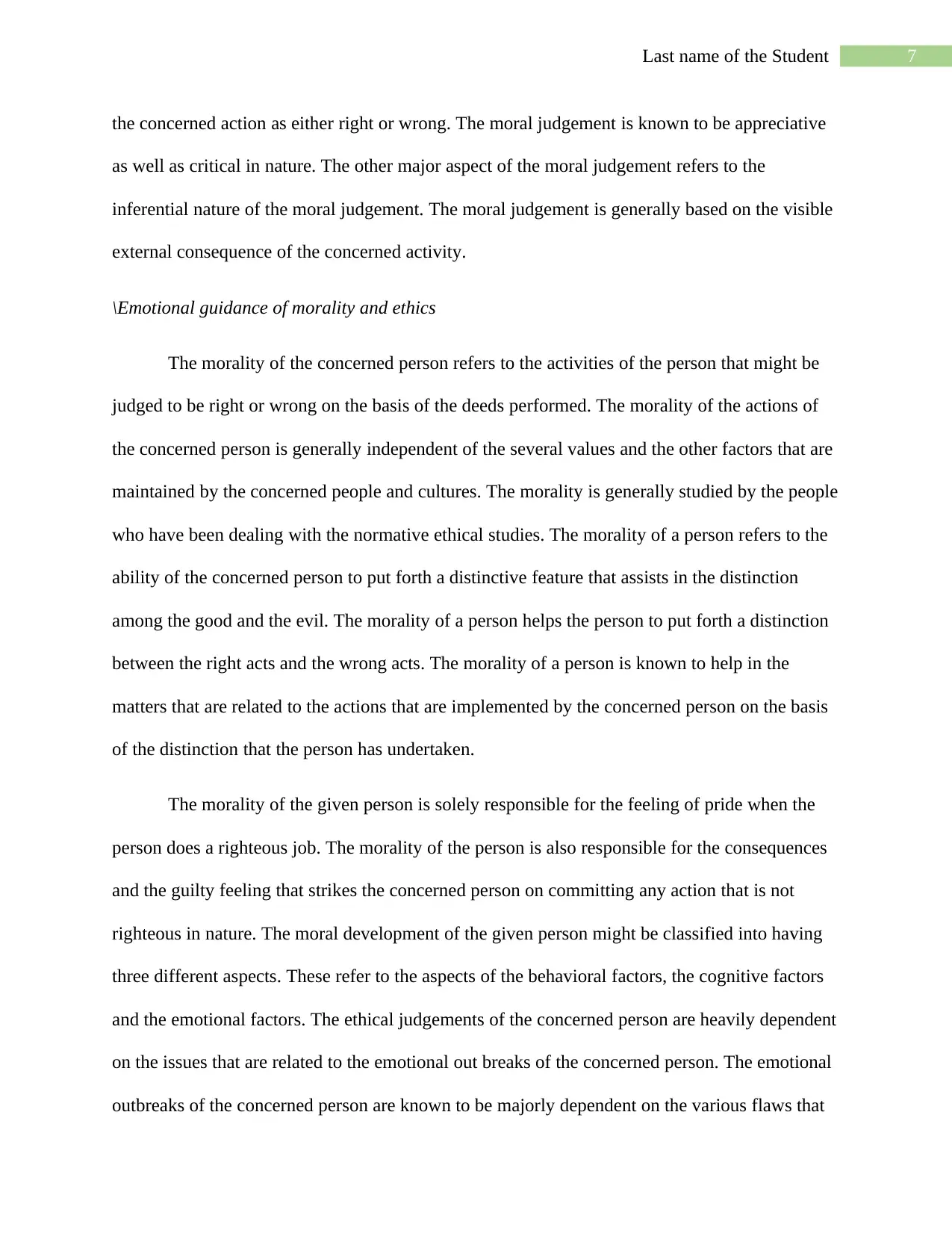
7Last name of the Student
the concerned action as either right or wrong. The moral judgement is known to be appreciative
as well as critical in nature. The other major aspect of the moral judgement refers to the
inferential nature of the moral judgement. The moral judgement is generally based on the visible
external consequence of the concerned activity.
\Emotional guidance of morality and ethics
The morality of the concerned person refers to the activities of the person that might be
judged to be right or wrong on the basis of the deeds performed. The morality of the actions of
the concerned person is generally independent of the several values and the other factors that are
maintained by the concerned people and cultures. The morality is generally studied by the people
who have been dealing with the normative ethical studies. The morality of a person refers to the
ability of the concerned person to put forth a distinctive feature that assists in the distinction
among the good and the evil. The morality of a person helps the person to put forth a distinction
between the right acts and the wrong acts. The morality of a person is known to help in the
matters that are related to the actions that are implemented by the concerned person on the basis
of the distinction that the person has undertaken.
The morality of the given person is solely responsible for the feeling of pride when the
person does a righteous job. The morality of the person is also responsible for the consequences
and the guilty feeling that strikes the concerned person on committing any action that is not
righteous in nature. The moral development of the given person might be classified into having
three different aspects. These refer to the aspects of the behavioral factors, the cognitive factors
and the emotional factors. The ethical judgements of the concerned person are heavily dependent
on the issues that are related to the emotional out breaks of the concerned person. The emotional
outbreaks of the concerned person are known to be majorly dependent on the various flaws that
the concerned action as either right or wrong. The moral judgement is known to be appreciative
as well as critical in nature. The other major aspect of the moral judgement refers to the
inferential nature of the moral judgement. The moral judgement is generally based on the visible
external consequence of the concerned activity.
\Emotional guidance of morality and ethics
The morality of the concerned person refers to the activities of the person that might be
judged to be right or wrong on the basis of the deeds performed. The morality of the actions of
the concerned person is generally independent of the several values and the other factors that are
maintained by the concerned people and cultures. The morality is generally studied by the people
who have been dealing with the normative ethical studies. The morality of a person refers to the
ability of the concerned person to put forth a distinctive feature that assists in the distinction
among the good and the evil. The morality of a person helps the person to put forth a distinction
between the right acts and the wrong acts. The morality of a person is known to help in the
matters that are related to the actions that are implemented by the concerned person on the basis
of the distinction that the person has undertaken.
The morality of the given person is solely responsible for the feeling of pride when the
person does a righteous job. The morality of the person is also responsible for the consequences
and the guilty feeling that strikes the concerned person on committing any action that is not
righteous in nature. The moral development of the given person might be classified into having
three different aspects. These refer to the aspects of the behavioral factors, the cognitive factors
and the emotional factors. The ethical judgements of the concerned person are heavily dependent
on the issues that are related to the emotional out breaks of the concerned person. The emotional
outbreaks of the concerned person are known to be majorly dependent on the various flaws that
Paraphrase This Document
Need a fresh take? Get an instant paraphrase of this document with our AI Paraphraser
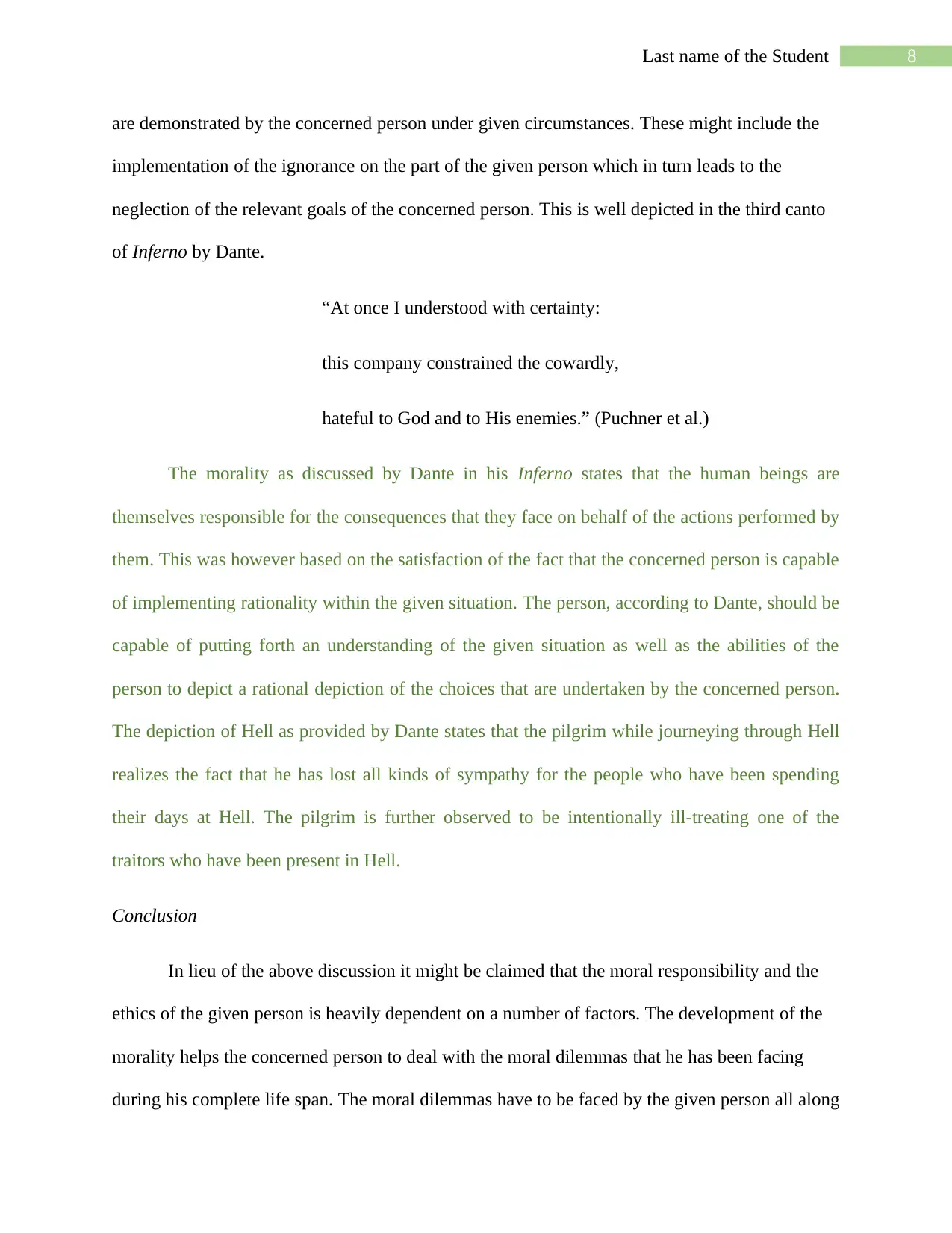
8Last name of the Student
are demonstrated by the concerned person under given circumstances. These might include the
implementation of the ignorance on the part of the given person which in turn leads to the
neglection of the relevant goals of the concerned person. This is well depicted in the third canto
of Inferno by Dante.
“At once I understood with certainty:
this company constrained the cowardly,
hateful to God and to His enemies.” (Puchner et al.)
The morality as discussed by Dante in his Inferno states that the human beings are
themselves responsible for the consequences that they face on behalf of the actions performed by
them. This was however based on the satisfaction of the fact that the concerned person is capable
of implementing rationality within the given situation. The person, according to Dante, should be
capable of putting forth an understanding of the given situation as well as the abilities of the
person to depict a rational depiction of the choices that are undertaken by the concerned person.
The depiction of Hell as provided by Dante states that the pilgrim while journeying through Hell
realizes the fact that he has lost all kinds of sympathy for the people who have been spending
their days at Hell. The pilgrim is further observed to be intentionally ill-treating one of the
traitors who have been present in Hell.
Conclusion
In lieu of the above discussion it might be claimed that the moral responsibility and the
ethics of the given person is heavily dependent on a number of factors. The development of the
morality helps the concerned person to deal with the moral dilemmas that he has been facing
during his complete life span. The moral dilemmas have to be faced by the given person all along
are demonstrated by the concerned person under given circumstances. These might include the
implementation of the ignorance on the part of the given person which in turn leads to the
neglection of the relevant goals of the concerned person. This is well depicted in the third canto
of Inferno by Dante.
“At once I understood with certainty:
this company constrained the cowardly,
hateful to God and to His enemies.” (Puchner et al.)
The morality as discussed by Dante in his Inferno states that the human beings are
themselves responsible for the consequences that they face on behalf of the actions performed by
them. This was however based on the satisfaction of the fact that the concerned person is capable
of implementing rationality within the given situation. The person, according to Dante, should be
capable of putting forth an understanding of the given situation as well as the abilities of the
person to depict a rational depiction of the choices that are undertaken by the concerned person.
The depiction of Hell as provided by Dante states that the pilgrim while journeying through Hell
realizes the fact that he has lost all kinds of sympathy for the people who have been spending
their days at Hell. The pilgrim is further observed to be intentionally ill-treating one of the
traitors who have been present in Hell.
Conclusion
In lieu of the above discussion it might be claimed that the moral responsibility and the
ethics of the given person is heavily dependent on a number of factors. The development of the
morality helps the concerned person to deal with the moral dilemmas that he has been facing
during his complete life span. The moral dilemmas have to be faced by the given person all along
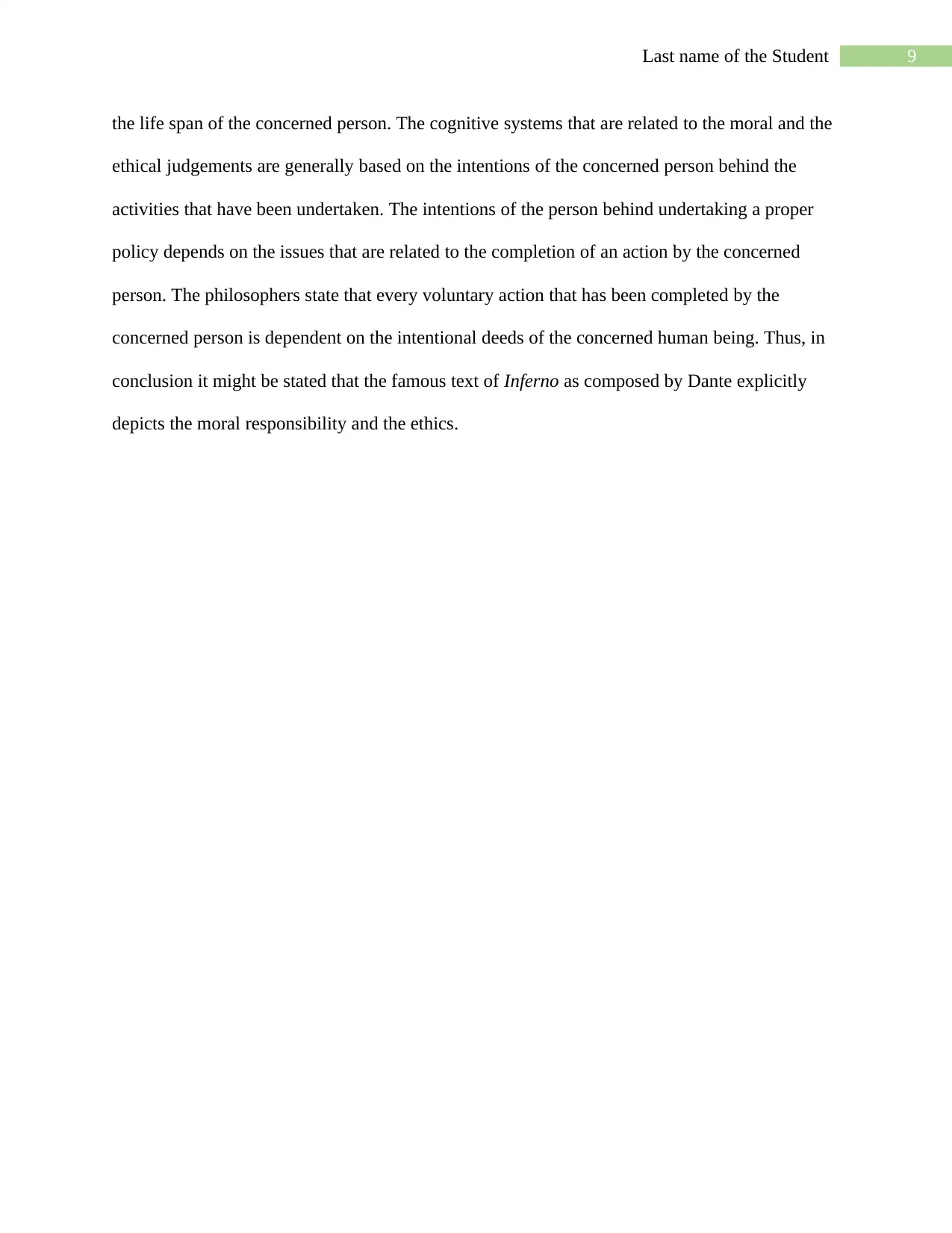
9Last name of the Student
the life span of the concerned person. The cognitive systems that are related to the moral and the
ethical judgements are generally based on the intentions of the concerned person behind the
activities that have been undertaken. The intentions of the person behind undertaking a proper
policy depends on the issues that are related to the completion of an action by the concerned
person. The philosophers state that every voluntary action that has been completed by the
concerned person is dependent on the intentional deeds of the concerned human being. Thus, in
conclusion it might be stated that the famous text of Inferno as composed by Dante explicitly
depicts the moral responsibility and the ethics.
the life span of the concerned person. The cognitive systems that are related to the moral and the
ethical judgements are generally based on the intentions of the concerned person behind the
activities that have been undertaken. The intentions of the person behind undertaking a proper
policy depends on the issues that are related to the completion of an action by the concerned
person. The philosophers state that every voluntary action that has been completed by the
concerned person is dependent on the intentional deeds of the concerned human being. Thus, in
conclusion it might be stated that the famous text of Inferno as composed by Dante explicitly
depicts the moral responsibility and the ethics.
⊘ This is a preview!⊘
Do you want full access?
Subscribe today to unlock all pages.

Trusted by 1+ million students worldwide
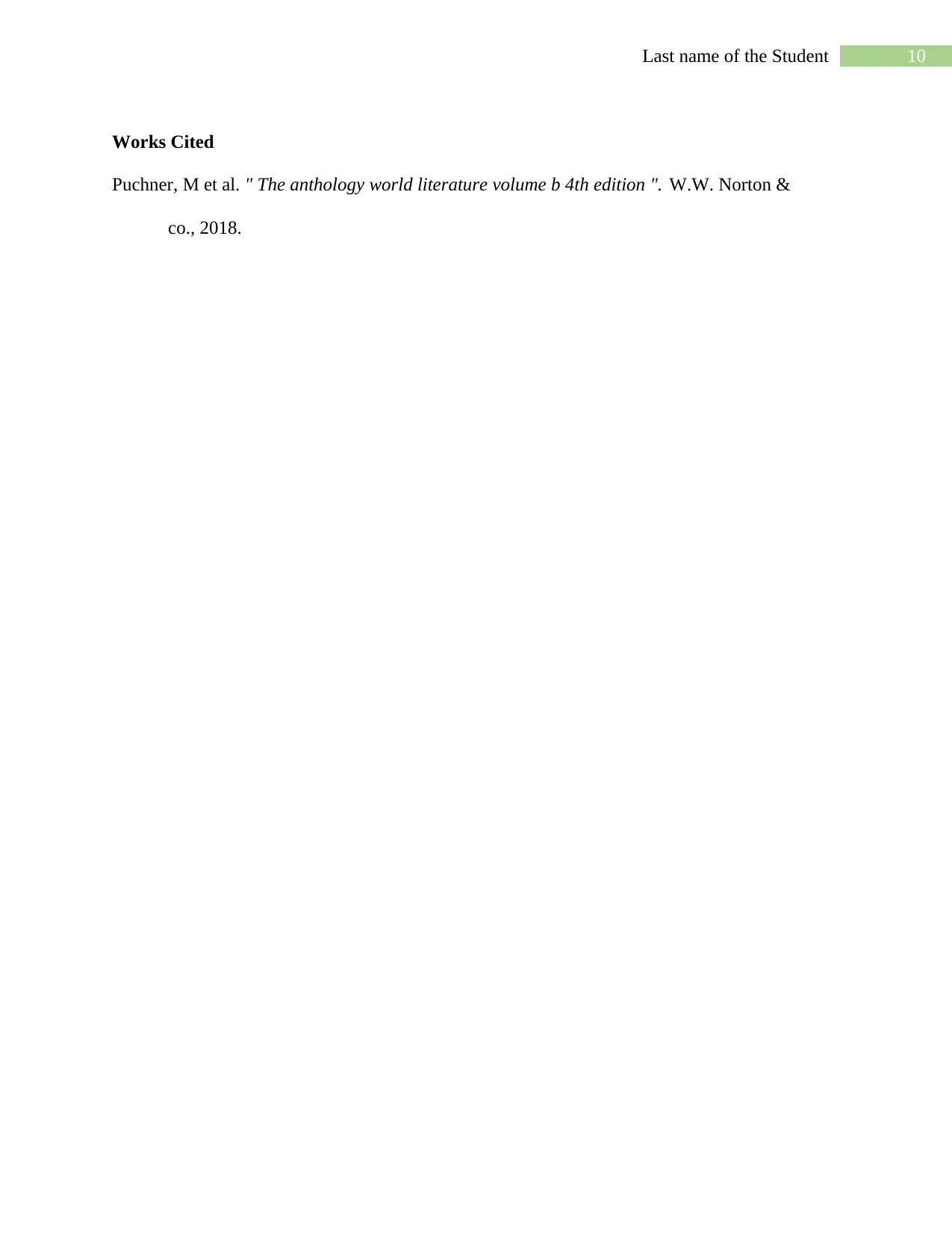
10Last name of the Student
Works Cited
Puchner, M et al. " The anthology world literature volume b 4th edition ". W.W. Norton &
co., 2018.
Works Cited
Puchner, M et al. " The anthology world literature volume b 4th edition ". W.W. Norton &
co., 2018.
1 out of 10
Related Documents
Your All-in-One AI-Powered Toolkit for Academic Success.
+13062052269
info@desklib.com
Available 24*7 on WhatsApp / Email
![[object Object]](/_next/static/media/star-bottom.7253800d.svg)
Unlock your academic potential
Copyright © 2020–2026 A2Z Services. All Rights Reserved. Developed and managed by ZUCOL.





